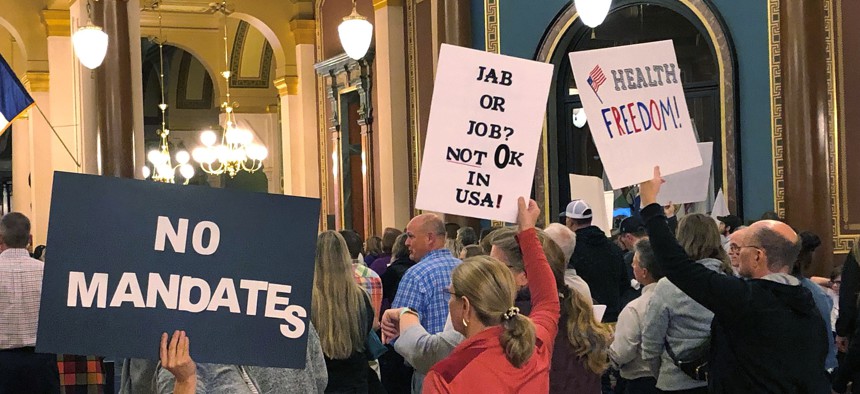States Decide if Workers Fired Over Vaccine Mandates Can Collect Unemployment

Protesters gather at the Iowa Capitol in Des Moines, Iowa, on Thursday Oct. 28, 2021, to push the Iowa Legislature to pass a bill that would prohibit vaccine mandates from being imposed on employees in Iowa. AP Photo/David Pitt
When employers fire people because they fail to follow company policy, employees are generally not eligible for benefits. But three states have or could make non compliant workers eligible.
Thousands of workers who refused to comply with their employers’ Covid-19 vaccine mandates have quit or been fired as the policies were enforced.
But whether those workers can collect unemployment benefits may depend on the state where they were employed.
Unemployment insurance experts said workers who are fired for failure to comply with company policy, like a vaccine mandate, are generally deemed ineligible for unemployment benefits because they were fired for misconduct.
Several Republican-led states have passed or are considering legislation that would explicitly allow those fired for refusal to be vaccinated to qualify for state-administered benefits.
Iowa lawmakers passed a bill late last month that allows employees in the state to seek medical and religious exemptions from vaccine mandates and guarantees unemployment benefits to those who are fired for refusal to be vaccinated. Gov. Kim Reynolds signed the bill into law, saying it “gives employees the assurance that they will still receive unemployment benefits despite being fired for standing up for their beliefs.”
Tennessee and Missouri are considering similar legislation.
Lawmakers’ response to the issue appears to be political rather than based on a desire to expand and protect unemployment benefits, said Andrew Stettner, a senior fellow at The Century Foundation. All three states are among those that stopped paying enhanced federal unemployment benefits early, citing difficulty getting people to return to work. The supplemental $300-a-week benefits were covered by the federal government through September but each state opted out of the payments months earlier.
It's unclear how many workers could benefit from the unemployment legislation.
A recent Kaiser Family Foundation survey found that 37% of unvaccinated workers (or 5% of adults overall) said they would leave their job if their employer required them to either get vaccinated or submit to weekly Covid-19 testing. About 5% of unvaccinated workers (or 1% of all adults) said they have left a job due to a vaccine requirement.
Thousands of city government employees have been placed on unpaid leave for failure to comply with municipal vaccine mandates deadlines, and many workers have opted to comply with mandates as they faced the prospect of suspension.
When employers implement vaccine mandates, failure to comply with those policies is viewed as misconduct, making it likely that fired employees would be deemed ineligible for benefits, Stettner said.
“The states cannot set up a requirement that you have to have a clean drug test to get unemployment insurance,” he said, providing an example of how unemployment eligibility rules work. “But if your employer requires a drug test and you fail it and get fired, you can’t get unemployment insurance. It’s misconduct.”
Workers could seek to challenge adverse rulings through administrative proceedings, but Stettner noted that many state unemployment agencies are running significantly behind in these types of cases. Where administrators are supposed to resolve eligibility challenges within 30 days, many are taking upwards of 90 days to issue decisions, he said.
Tennessee lawmakers approved a package of bills this month that allows workers who quit their jobs because of Covid-19 vaccine mandates to receive unemployment benefits. Legislation approved by lawmakers in special session would also roll back other coronavirus-related, limiting the ability of schools to enforce mask mandates and preventing private companies and public entities from mandating vaccines.
Gov. Bill Lee, a Republican, is reviewing the legislation and has not yet signed any of the bills into law.
Regardless of whether the bill becomes law, Tennessee would not find the worker to blame if an employer had already hired them and then imposed a vaccine mandate, state officials told Nashville Public Radio.
“We would consider that a change in the hiring agreement and there would be no breach by the claimant for failure to comply with that requirement,” Melissa Owens, the assistant administrator of the state’s unemployment trust fund, told the station.
In Missouri, Gov. Mike Parson is considering whether to implement similar protections for workers, according to the St. Louis Post-Dispatch. The state’s legislature has not taken up the matter.
“People need to work but should not be forced to choose between their job and allowing the Biden administration to dictate their personal health decisions,” Parson spokeswoman, Kelli Jones, told the Post-Dispatch.
Andrea Noble is a staff correspondent with Route Fifty.
NEXT STORY: As Trash Pickup Problems Mount, One Local Government Steps In, Then Out





